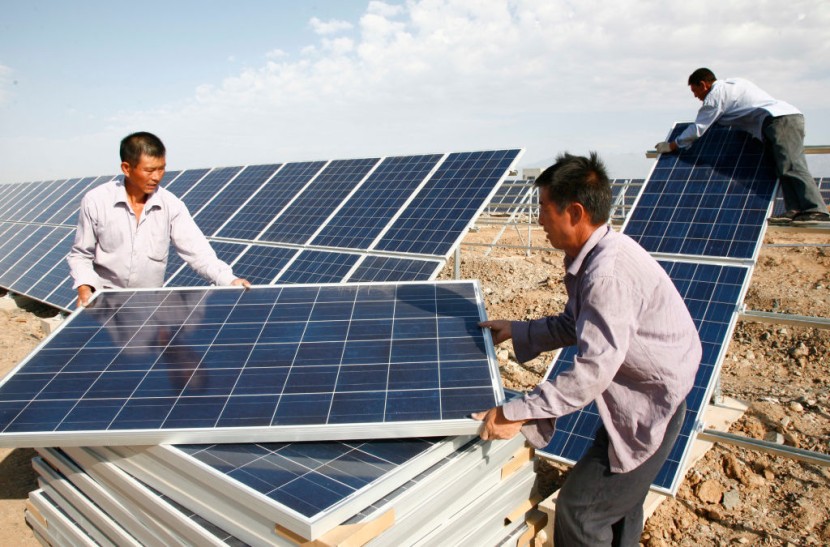
The Biden administration imposed a ban on the US imports of a major solar panel material from China-based Hoshine Silicon Industry Co. on Wednesday due to suspicions of forced labor, said two sources briefed on the matter.
According to the White House, Xinjiang-based Hoshine Silicon Industry Co. will not be able to sell its products in the US owing to evidence reasonably indicating that Hoshine conducted forced labor to manufacture silica-based products. Due to their involvement in the exploitation of workers, the Commerce Department declared that Hoshine and four other Xinjiang companies should comply with relevant limitations on their ability to buy US commodities, software, and technology.
The US imposes trade bans on Xinjiang companies
Separately, the US Commerce Department prohibited exports to Hoshine, three other Chinese firms, and the paramilitary Xinjiang Production and Construction Corps (XPCC), alleging involvement in the forced labor of Uyghurs and other Muslim minority groups in Xinjiang. A subsidiary of Daqo New Energy Corp, Xinjiang Daqo New Energy Co; a subsidiary of Shanghai-based manufacturing conglomerate East Hope Group, Xinjiang East Hope Nonferrous Metals Co; and a subsidiary of GCL New Energy Holdings Ltd, Xinjiang GCL New Energy Material Co, are the three other companies added to the US economic blacklist.
The companies and XPCC were "involved in human rights violations and abuses in the implementation of China's campaign of repression, forced labor, mass arbitrary detention, and high-tech surveillance against Uyghurs, Kazakhs, and other members of Muslim minorities in Xinjiang," according to the Commerce Department. At least some of the listed companies are leading manufacturers of monocrystalline and polycrystalline silicon, both of which are used in the making of solar panels.
The majority of metallurgical-grade silicon is found in various manufacturing and comprises at least 98 percent silicon. It is not as pure as electronic-grade silicon, which is required for the manufacture of electronics like computer chips.
Producers from the areas that supply almost half of the world's polysilicon used in solar panels were impacted by the moves, as per AFP via MSN. A US Customs and Border Protection official who restricted Hoshan imports said the US bought items worth $150 million from the firm in the previous 30 months.
When asked if the US trade measures may clash with the promotion of solar energy, US Homeland Security Secretary Alejandro Mayorkas stated that the priority is to end forced labor. Hoshine's import restriction follows similar measures taken against makers and consumers of cotton and tomato products, as well as hair items such as weaves from the region.
Per SCMP, US firms must get a license to sell products or technology to blacklisted companies under such limitations, although such exceptions are seldom granted. The US market for Chinese solar panel manufacturing is small, but there are few import choices outside of China, according to Peng Peng, general secretary of the China New Energy Investment and Financing Alliance.
Peng further stated that China produces around 76% of the world's polysilicon, with manufacturing centers mostly in Xinjiang, Inner Mongolia, Sichuan province, and Yunnan province.
Previous US bans against Chinese companies over forced labor concern
The US prohibited the purchase of seafood from a fleet of Chinese fishing vessels earlier this year, citing China's use of forced labor. The US Customs and Border Protection (CBP) has placed an import restriction on seafood from China's fishing fleet, which it claims has participated in forced labor, including violations against numerous Indonesian employees on its 32 vessels.
According to CBP authorities, their year-long investigation clearly shows the major indicators of forced labor on the 32 vessels owned or operated by Dalian Ocean Fishing Co. Ltd., including wage withholding, physical abuse, and movement restrictions. CBP claimed to have discovered 11 of the International Labor Organization's indications of forced labor during an inspection, including physical assault, wage withholding, and harsh working and living circumstances, Republic World reported.
The Trump administration issued an import embargo on all cotton and tomato products from Xinjiang during its final week in office, citing claims that they were produced with Uyghur forced labor, forcing clothing companies to reorganize supply chains. The latest restriction adds to the United States' efforts to penalize China for its mistreatment of Indonesian bonded laborers at Dalian Ocean Fishing.
Related Article: Trudeau Dares China for a Public Probe Over Uyghur Mistreatment as Beijing Attacks Canada's Human Rights Record
@YouTube
© 2026 HNGN, All rights reserved. Do not reproduce without permission.








